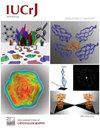Structure of MltG from Mycobacterium abscessus reveals structural plasticity between composed domains
IF 3.6
2区 材料科学
Q2 CHEMISTRY, MULTIDISCIPLINARY
引用次数: 0
Abstract
We provide the structure of MltG of the lytic transglycosylase family in this study. We show that MltG has a flexible peptidoglycan-binding domain and exists as a monomer in solution. Further, the putative active site of Mycobacterium abscessus MltG has been revealed using structural analysis and sequence comparison. This research significantly advances our comprehension of the transglycosylation process mediated by the MltG family, providing valuable insights that can inform the development of next-generation antibiotics to specifically target M. abscessus.
MltG, a membrane-bound lytic transglycosylase, has roles in terminating glycan polymerization in peptidoglycan and incorporating glycan chains into the cell wall, making it significant in bacterial cell-wall biosynthesis and remodeling. This study provides the first reported MltG structure from Mycobacterium abscessus (maMltG), a superbug that has high antibiotic resistance. Our structural and biochemical analyses revealed that MltG has a flexible peptidoglycan-binding domain and exists as a monomer in solution. Further, the putative active site of maMltG was disclosed using structural analysis and sequence comparison. Overall, this study contributes to our understanding of the transglycosylation reaction of the MltG family, aiding the design of next-generation antibiotics targeting M. abscessus.
脓肿分枝杆菌 MltG 的结构揭示了组成结构域之间的结构可塑性。
MltG 是一种膜结合型溶解性转糖基化酶,在终止肽聚糖中的糖聚合以及将糖链结合到细胞壁中方面发挥作用,因此在细菌细胞壁的生物合成和重塑中具有重要作用。本研究首次报道了脓肿分枝杆菌(maMltG)的 MltG 结构,这是一种具有高度抗生素耐药性的超级细菌。我们的结构和生化分析表明,MltG 有一个灵活的肽聚糖结合域,在溶液中以单体形式存在。此外,通过结构分析和序列比较,我们还揭示了maMltG的推定活性位点。总之,这项研究有助于我们了解 MltG 家族的转糖基化反应,有助于设计针对脓肿霉菌的下一代抗生素。
本文章由计算机程序翻译,如有差异,请以英文原文为准。
求助全文
约1分钟内获得全文
求助全文
来源期刊

IUCrJ
CHEMISTRY, MULTIDISCIPLINARYCRYSTALLOGRAPH-CRYSTALLOGRAPHY
CiteScore
7.50
自引率
5.10%
发文量
95
审稿时长
10 weeks
期刊介绍:
IUCrJ is a new fully open-access peer-reviewed journal from the International Union of Crystallography (IUCr).
The journal will publish high-profile articles on all aspects of the sciences and technologies supported by the IUCr via its commissions, including emerging fields where structural results underpin the science reported in the article. Our aim is to make IUCrJ the natural home for high-quality structural science results. Chemists, biologists, physicists and material scientists will be actively encouraged to report their structural studies in IUCrJ.
 求助内容:
求助内容: 应助结果提醒方式:
应助结果提醒方式:


